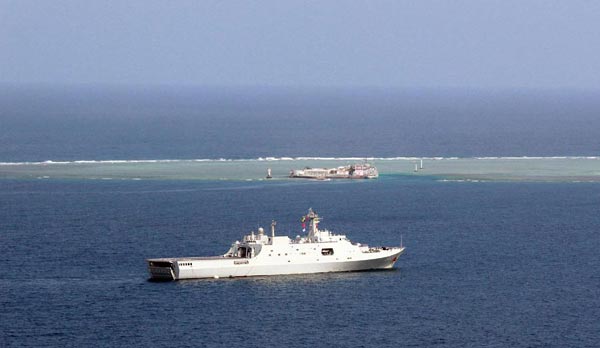US' provocations inflame South China Sea tensions
Updated: 2015-12-21 07:45
(China Daily)
|
||||||||
 |
|
A formation of the Nanhai Fleet of China's Navy on Saturday finished a three-day patrol of the Nansha islands in the South China Sea. [Photo/Xinhua] |
The United States owes China a reasonable explanation as to why US B-52 bombers entered Chinese airspace near the Nansha Islands on Dec 10.
China's Defense Ministry urged the US to stop such dangerous and provocative actions, which have become another source of tension between both countries along with the US government's announcement of a new arms sale to Taiwan last week.
The Pentagon said the military aircrafts had strayed off course due to bad weather and an investigation has been launched.
Yet, considering the US guided missile destroyer USS Lassen illegally entered waters near Zhubi Reef, part of China's Nansha Islands, on Oct 28, on what the US disingenuously called a "freedom of navigation" mission, it is only natural that many Chinese do not feel convinced by the Pentagon's explanation.
Hence, China is fully justified in demanding that the Pentagon seriously delve into the incident, produce a convincing explanation and take measures to prevent such overflights in future.
Repeated US provocations have fueled tensions in the South China Sea, doing a disservice to regional efforts for peace and stability in the waters and undermining efforts to resolve the maritime disputes between some countries and China through dialogue and negotiation.
The US claims to be a Pacific power, but with its provocative actions and rhetoric, it seems it is not intent on using its power to play a constructive role in the region
The US is among a few countries that have vehemently criticized China's lawful right to build on its reefs and islets, and the USS Lassen incident marks heightened US efforts to interfere in the issue.
Some in Washington have accused China of militarizing the waters. But such allegations do not hold water and merely act as mirror for the US' actions, which speak louder than words. From the incursions of the USS Lassen and the B-52 bombers into Chinese waters and airspace, and the US' decision to sell another arms package to Taiwan, an inalienable part of China, it is crystal clear that it is the world's sole superpower that is militarizing not only the South China Sea but the region at large.
The escalation of US provocations in the South China Sea will compel China to respond with more countermeasures, including military ones, and thus trigger an undesirable circle of provocation and response between the two countries in the waters.
Is this what the US really wants to happen?
- 10 execs suspected of faking pollution data
- Top 10 social media events of 2015
- Life sentences for east China child traffickers
- Shenzhen leaps to top of efficiency list in 2 yrs
- Pandas prefer choosing their own sex partners, researchers find
- Tycoons exchange views on building a cyberspace community of shared future
- Iraq holds its first beauty contest in 40 years
- Libyan factions sign UN deal to form unity government
- World's refugees and displaced exceed record 60 million
- No specific, credible terror threats against US: Obama
- UN Security Council adopts resolution to cut off Islamic State funding
- California shooters' ex-neighbor charged with supporting terrorists

 Iraq holds its first beauty contest in 40 years
Iraq holds its first beauty contest in 40 years
 Highlights at the Light of the Internet Expo
Highlights at the Light of the Internet Expo
 Finger Icons: Guess who's who
Finger Icons: Guess who's who
 Older mother who lost only child delivers another baby
Older mother who lost only child delivers another baby
 Top 10 most attractive FDI destinations in the world
Top 10 most attractive FDI destinations in the world
 Canadian college offers flying classes to legless girl
Canadian college offers flying classes to legless girl
 Fashion buyer scours the world for trendy items
Fashion buyer scours the world for trendy items
 Tycoons exchange views on building a cyberspace community of shared future
Tycoons exchange views on building a cyberspace community of shared future
Most Viewed
Editor's Picks

|

|

|

|

|

|
Today's Top News
Shooting rampage at US social services agency leaves 14 dead
Chinese bargain hunters are changing the retail game
Chinese president arrives in Turkey for G20 summit
Islamic State claims responsibility for Paris attacks
Obama, Netanyahu at White House seek to mend US-Israel ties
China, not Canada, is top US trade partner
Tu first Chinese to win Nobel Prize in Medicine
Huntsman says Sino-US relationship needs common goals
US Weekly

|

|








